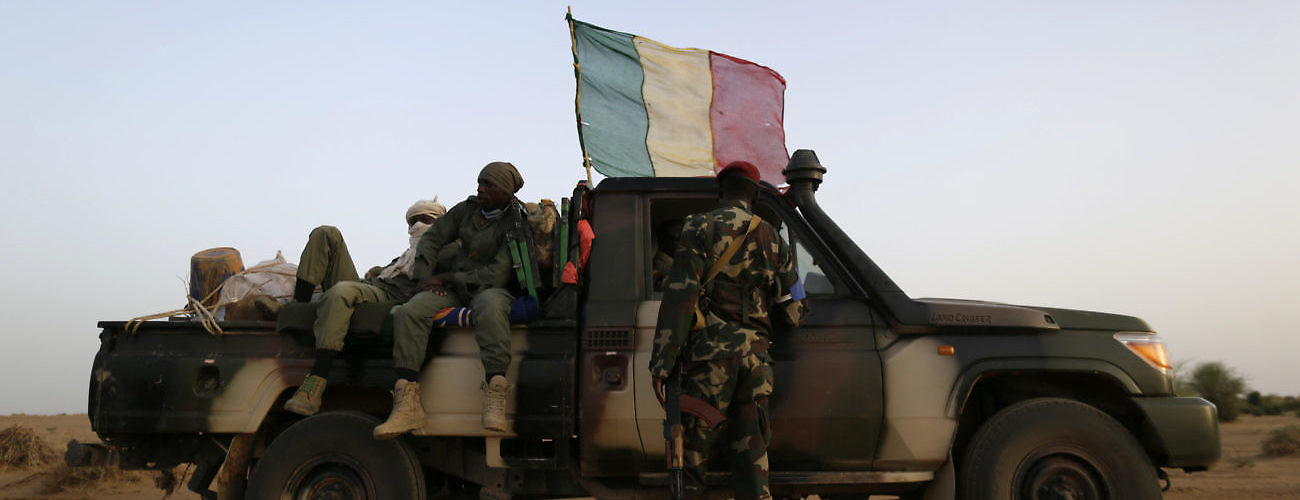Malian soldiers patrol on a road between Gao and Kidal in northern Mali. (KENZO TRIBOUILLARD/AFP via Getty Images)
The attack on a military outpost near Mali’s border with Niger in which 53 soldiers and one civilian were killed on November 2, exemplifies the resilience of the Islamic State (IS) across countries in Africa. It also sends a message that IS, despite losing its founder and some of its top commanders in the Middle East last month, still has fighters loyal to its cause and has strengthened.
The Islamic State operates in the extremely arid Sahel region through its affiliate group, the Islamic State in the Greater Sahara (ISGS), which has extended its operation in recent years from Mali to neighboring Niger and Burkina Faso. ISGS is undoubtedly one of the most dangerous militant groups in the region and exploits the disaffection of marginalized communities to recruit fighters by presenting itself as the solution to the conflict in the region.
The last year has shown that ISGS is gaining momentum. In 2018, ISGS was linked to 26 percent of all attacks and 42 percent of all fatalities associated with terror groups in the Sahel, according to a report by the Washington-based Africa Center for Strategic Studies. It is expected that, at the current pace, the group will be responsible for close to 600 fatalities by the end of 2019, far more than any other Islamist group in the region.
A number of factors are helping ISGS strengthen. A primary one is the neglect of local communities by governments, whether intentionally or due to lack of resources. This has created fertile ground for ISGS to fill the gaps in services and portray themselves as benevolent. Another reason is ethnic differences in many regions where ISGS currently operates. These differences have fueled violence, severely impacted local economics, and bred disaffection among civilian populations—young people in particular. ISGS recruiters have taken advantage by offering protection and economic opportunities. A related factor is the extreme poverty that exists in these same local and rural areas. The confluence of these factors creates fertile ground to recruit young militants, and has strong parallels to the circumstances that propelled the Islamic State into existence in the first place.
An example of how ISGS recruits is in Niger, where its ability to draw fighters has helped widen its operations in the west of the country. Many locals, especially the Fulani in the Tillabéri region, are in dire need of protection against cattle theft by suspected Tuareg militants, and joining the group presents an opportunity to take on the Tuareg majority, who they believe are a threat to their businesses and existence. ISGS has stoked these divisions to attract members.
Recruits that end up joining ISGS are, on the whole, less motivated by fighting a religious war than by disillusionment with local governments and the abuses carried out by military forces in their anti-terrorism operations. Many forces have been accused of killing villagers indiscriminately for suspected involvement with terrorist groups. These abuses are driving people to join ISGS, and as long as they continue, ISGS will gain more militants. One need only to look at Syria to see where such actions could lead, as Bashar al-Assad regime’s extreme response in targeting perceived terrorists led to an increase in the ranks of IS and in the splintering of Syrian society.
ISGS is distinguished from IS in Syria in the way it operates. ISGS commanders have learned from the errors made in the Middle East and, rather than putting effort into gaining territory, are focused on growing relationships with local communities and taking advantage of those relationships to exert influence on them. What ISGS understands is that incorporating into local communities will make it much easier to gain support and a strong presence in the Sahel.
With such tactics, it becomes hard for government forces in the region to successfully take on the group. Moreover, ISGS members tend to blend with the local population and largely pass undetected if they are not actively engaged in an attack. Thus, though ISGS wears the Islamic State nomenclature to extend its brutality and draw attention to its operations, the Sahel-based group functions based on its own objectives and inclinations. These differences are the source of a growing fear that ISGS may extend its activities beyond the Sahel into more peaceful parts of West Africa, especially in Benin, where militants kidnapped two French tourists and murdered their guards in May.
The creation of the Group of Five for the Sahel (G5 Sahel) by Mauritania, Mali, Burkina Faso, Niger, and Chad, shows that governments take the pressing economic and security challenges in the region seriously. However, the G5 Sahel has been criticized for relying heavily on the international community for funding and logistics, and for not contributing enough forces to the initiative, which has threatened its very objectives. For anything meaningful to come out of this alliance, or any initiative aimed at combating ISGS and other militant groups, governments must show seriousness in contributing not only troops, but resources that will address the underlying social and economic issues that affect areas where groups operate.





